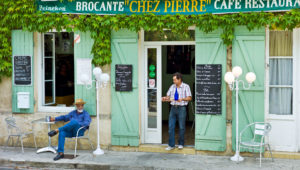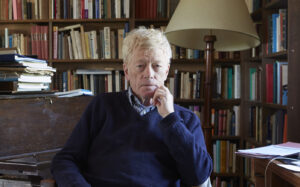Le Havre, France
At a political rally in the Normandy port town of Le Havre, an elderly man with flowing white hair and beard waves a tricolour gently in my face. On it is written “Ni Fascio, ni BoBo [bourgeois bohemian, akin to radical chic], mais Patriot”. It’s a neat triangulation, intended to paint his party, Marine Le Pen’s Rassemblement National, as the sensible, “love-my-country” alternative to mainstream politics. Less subtle are the party T-shirts worn by the RN Jeunesse (members under 30), which bark the slogan: “Nous n’avons pas fini d’etre Francais!” Rassemblement are on the march, spurred by the collapse in President Macron’s domestic authority after his pension reform devolved into a festival of protest and violence. They believe that, after decades spent as political outsiders, they can lead the next French government.
The challenge posed by the European New Right is now too insistent to ignore. In the last year, it has won an election in Italy and joined a government in Sweden. Alongside the established administrations in Poland and Hungary, which share its stances on immigration, globalisation and social morality, a new bloc of national dissent inside the European Union is emerging. It would be greatly augmented if Marine Le Pen, the architect of the modern Rassemblement and its co-leader, wins the presidential election in 2027. And she is leading recent polls.
Le Pen has long understood that she can only win if she can present the party as cleansed of extremism, racism and, above all, antisemitism. Performative sanitisation has been the project of her leadership since 2011. And that included clearing out her father, Jean-Marie, now 94, and changing the party name associated with him (Front National) in 2018. When Jean-Marie reached the second, decisive round of the presidential in 2002 against the centre-Right Jacques Chirac, the 82% who re-elected Chirac — including many on the Left — repeated (with scorn) the slogan: “Better to vote for a crook than a fascist!” Jean-Marie was certainly something like a fascist, and harboured a pronounced hatred of Jews. When he referred to the Holocaust as “a detail”, his daughter finally threw him out of the party. Since then, it has reached the cusp of power — two presidential final round contests against Emmanuel Macron, in which it increased its vote from 33.9% in 2017 to 41.5% in 2022.
Last Monday, Rassemblement choreographed the rally in Le Havre to toast its opponent’s misfortune. The event was a Mayday Fête de la Nation, involving 1,500 party members drawn from across France. Hosted in a large modern hall overlooking the harbour, and seated at long tables radiating out from a central stage, the party faithful were treated to a leisurely lunch of duck terrine, and glasses of kir and red wines. The real treat, however, came in the form of two speeches by the party’s joint-leaders who encapsulate its cross-generational appeal — 53-year-old Marine Le Pen and 27-year-old Jordan Bardella. Having joined the party at 16, Bardella is a political prodigy and protégé of Le Pen. Aged just 19, he became the party’s local secretary for the département Seine-Saint-Denis, a poor suburb north of Paris that is important for Rassemblement because of its long association with the working-class Left. He is now President of the party, while Le Pen leads its 89 parliamentary deputies in the Assemblée Nationale.
Bardella followed Le Pen onto the stage as the lunch was ending, and roused the audience into an enthusiastic peal of applause and vigorous flag-waving (each table was issued with a stack of petites tricoloures). “La politique,” Le Pen began, “est un acte d’amour”: and love was the focus of her speech, love of her nation’s villages, of its people, of France itself, and above all of its sovereignty, of its freedom to be what it has ever been, “grande et belle”. Yet, in a more melancholy register, she articulated the catastrophes which had befallen it: “chaos become endemic, an atmosphere of exhaustion, of violence rising up from nowhere”. Her solutions: ending the flow of migrants, preserving the ecology of France through an end to globalisation, and conquering the subtle enemy within, “wokeisme”, which threatened “the end of thousands of years of history and of culture”.
Bardella, as fluent and passionate as his patronne — to whom, in his first public speech as party president, he made both a verbal and a physical bow — was given the glad duty of a frontal attack on Macron. This avatar of a failed liberalism, Bardella said, was responsible for the suffering of the French, for the crumbling of public services, for the degradation of France’s history. Imagine, he begged his audience — their repast complete, now waving their tricolours almost without pause — a country “where every Frenchman and French woman were living under the same flag, the same language, the same culture”. As his voice rose in fervour, he gestured for the audience to rise, and they did, breaking into the Marseillaise — “Allons, enfants de la Patrie!”
Rassemblement is now substantially in tune with French public opinion on Left and Right. The daily Figaro, on the centre-Right, carried an editorial the day before the Fête which remarked that “the polls show that the French are no longer listening to the government”, adding that, after she failed to push Macron’s pension reform through parliament, “the Prime Minister [Élisabeth Borne] and the President are no longer on the same wavelength”. Le Monde, which leans Left and has a habit of quoting liberal intellectuals, hosted the historian Pierre Rosanvallon, who saw a population “united by being held in contempt” (by Macron), and said the French are reminding him: “We are there, we exist, you can’t make us shut up.” And Dominique Strauss-Kahn, whose political career took him to the top of the IMF (from which a sex scandal ejected him), has said that Macron’s mistake was to push for an extension of the working life at a time when the French had other problems. The general sense in the French public sphere is that raising the pension age might be a good idea, but now is not the time to do it.
The combined Left, quarrelsomely united under the umbrella organisation La France Insoumise (France Unbowed) and led by the 71-year-old radical socialist Jean-Luc Mélenchon, also sees the turbulence as an opportunity for political transformation. Speaking in Paris at a Mayday demonstration, Mélenchon shouted that, “We have had no master since 1789 but the people themselves … The solemn appeal I bring to you is: ‘Never give up!’ Nothing, never. The struggle continues.” A little way away, before Paris’s city hall, a prominent young Insoumise deputy, Antoine Léaument, was giving the media what they craved: a direct call to a revolution. “We must nourish the flame of this kind of revolutionary moment, right up to July 14th (Bastille day).” Mélenchon also mentioned the talismanic date, on which, Léaument believes, the world will be turned upside down, and witness “a great coming together of social revolt … Our sole limit will be an attack on the physical integrity of individuals.”
At the same time, on a stage 200 kilometres away, Bardella was claiming the votes of the workers for Rassemblement, calling Mélenchon “the past” and curtly dismissing the Left as “irresponsible, with no plan for France”. And, though over 50% of France now votes for the hard Left or the hard Right, Insoumise is wracked by internal disputes. L’Express magazine recently carried a poll which showed that Mélenchon himself was substantially less popular than a likely challenger, the 47-year-old journalist and Insoumise deputy for La Somme, François Ruffin. With such dissent, Mélenchon’s momentum and command seem unstable, and any leadership struggle will only benefit Le Pen.
When Bardella and Le Pen descended from the stage, signalling the closing of the Fête, they could barely move for half an hour, besieged by autograph-seekers, selfie-snappers and endless handshakes. Every so often, before departing the hall, groups would strike up chants of “Marine President, Marine President!” The speeches were a reminder that the purpose of this party is not merely to move a little to the Left or to the Right while preserving the same social order, but to bring that order to a close.
The uncompromising and emotive patriotism of Le Pen and Bardella encases a nationalist politics against which Macron has fought through all of his first five presidential years. But, as his internationalist project has faltered, he has had to reckon with the ardent attachment of many French towards the Patrie of which they are enfants — and not the borderless European Union which he has seemed to prioritise. Rassemblement have bet that the French people will reject his cosmopolitanism outright — and, more crucially, that they will judge the party sufficiently cleansed of its fascist taint for it to govern.
Disclaimer
Some of the posts we share are controversial and we do not necessarily agree with them in the whole extend. Sometimes we agree with the content or part of it but we do not agree with the narration or language. Nevertheless we find them somehow interesting, valuable and/or informative or we share them, because we strongly believe in freedom of speech, free press and journalism. We strongly encourage you to have a critical approach to all the content, do your own research and analysis to build your own opinion.
We would be glad to have your feedback.
Source: UnHerd Read the original article here: https://unherd.com/





